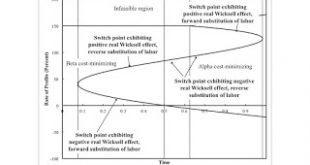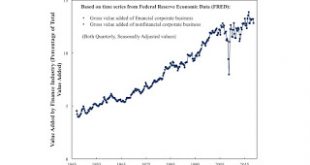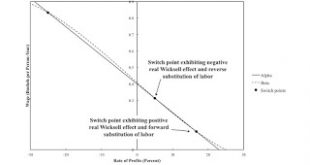Figure 1: APP Around Switch Points1.0 Introduction I take it that the Austrian theory of the business cycle builds on Austrian capital theory. The following two claims are central to Austrian capital theory: Given technology, profit maximizing firms adopt a more capital-intensive, more roundabout technique at a lower interest rate. The adoption of a more roundabout technique increases output per worker. Originally, Eugen von Böhm-Bawerk proposed a physical measure of the average period...
Read More »Refutation Of Austrian Business Cycle Theory
Those who understand price theory reject the theory of the Austrian Business Cycle (ABC). I am thinking here that its logical invalidity follows from post-Sraffian capital theory. It is also wrong because of its reliance on the concept of the natural rate of interest. Some years ago, I tried to get published a demonstration that ABC theory was in error. I forget how many journals rejected it. Four or five articles here are from this series of revisions. The rejections from the journals...
Read More »Some Reviews of Quiggin’s Economics in Two Lessons
I have been thinking of posting a review of Quiggin's book, but this is not it. I suppose I should mention that I am in the acknowledgements. Jorge Besada raves at the Mises Institute. Peter Boettke on his blog. Tyler Cowen lists Quiggin's book in his current reading. Diane Coyle on her blog. David Gordon at the Mises Institute. Richard Holden at Inside Story. Arnold Kling on his blog. "hayekian" raves. Quiggin has a response to a couple of the above. By the way, he had a paper, in 1987,...
Read More »All Combinations of Real Wicksell Effects, Substitution of Labor
Figure 1: A Pattern Diagram Consider an example of the production of commodities, in which many commodities are produced within capitalist firms. Suppose two techniques are available to produce a given net output. These techniques use the same set of capital goods, albeit in different proportions. They differ in process in use for only one industry. Given the qualification about the same capital goods, generic (non-fluke) switch points are the intersection of the intersection of the wage...
Read More »Alfred Eichner’s Microfoundations, Or An Open Letter To Marco Rubio
The Growing Importance of Finance in the Post-War U.S. Economy As I understand it, Marco Rubio takes from Post Keynesians the idea that, during the post-war golden age, investment decisions were dominated by industrial firms. But now, they are dominated by financial corporations. This change has been accompanied by deleterious effects on economic growth, stagnant wages, and an upward shift in the distribution of income and wealth. The increasing importance of finance in the economy in the...
Read More »Elsewhere
Ezra Klein writes about John Kenneth Galbraith's concept of countervailing power. Ingrid Kvangraven and Carolina Alves are busting myths about heterodox economics. I have written before about economics as a study of the reproduction of society. Ben Holland, of Bloomberg News, writes an article, Marco Rubio puts out a paper citing obscure left-wing economists. Rubio's position paper is here. I do not find, say, Wynne Godlay, Hyman Minsky, Mariana Mazzucato, and many proponents of Modern...
Read More »How To Defend Capitalism?
1.0 Summary of Defense Last month, Mike Munger purports to "summarize the basic argument for capitalism" (emphasis added). He acknowledges his argument is superficial. I find it excessively so. Munger argues that capitalism: Supports the division of labor Provides price signals so as to direct production appropriately Promotes economies to scale Ultimately, this defense is that capitalism delivers the goods. Here's a well-expressed, simple defense that, partially, argues along these...
Read More »Positive Real Wicksell Effect, Forward Substitution Of Labor
Figure 1: Wage-Rate of Profits Curves Consider a comparison of comparison of stationary states. Net output is taken as given, and a unit of net output is the numeraire. Technology consists of a finite set of techniques. In each technique, net output is produced from inputs of labor and produced circulating capital goods. No fixed capital is used, and land of the best quality is in such abundance that it is free. Also assume constant returns to scale. One can find a wage-rate of profits...
Read More »Some Experts On The Cambridge Capital Controversy
Many years ago, I used to argue, on Usenet, about the Cambridge Capital Controversy. Many mainstream economists used to ignorantly assert, when pretending to respond, that an application of the CCC to labor economics was my idea alone. So I used to demonstrate that this was false by quoting from the literature. As far as I can see, mainstream economists are still mostly trained into ignorance. P. Garegnani: "The idea that demand and supply for factors of production determine...
Read More »Gramsci Should Be Difficult To Understand
Fact: If you use the word "carceral" instead of "prison" your argument immediately becomes more persuasive. Good praxis is to use words like "praxis" that nobody understands. -- Matthew Yglesias (5 April 2019, on Twitter) A large academic literature exists around Antonio Gramsci's Prison Notebooks. Topics discussed include the relationship of civil society to the state, hegemony, the contrast between consent and coercion, class alliances in political parties, Fordism, the contrast...
Read More » Robert Vienneau: Thoughts Economics
Robert Vienneau: Thoughts Economics




